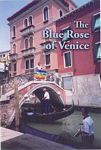| » Cover | ||
|
Reviews
The Blue Rose of Venice by Thomas Rain Crowe
We walked ten minutes His exhaustion and frustration are clearly evident as "tired and lost in Venice at dusk," his ten minutes become twenty minutes as he struggles with directions. When they reach their destination, however, all is not well as he discovers their reservations are not to be found. Fortunately for the weary travelers, an angel comes to their rescue and they are able to enjoy "several days with a series of hurdles and intervening angels" in this quixotic city. The symbolism in "The Madonna of the Knots" is not "lost along the way" as surely the author and his wife were. The Mother Superior ensured their protection with a holy card. The sharpest contrast between the old Venice and the new Venice is seen in the "Song of the Gondolier." The beautiful images of
short bridges. The photograph on the book's cover comes from "Unfurling a Peace Flag on the Ponte Della Guerra Against the War." Crowe purchases a peace flag and tells Nan to take a picture of him on the bridge with it. "En Italia, the peace flags are only done by liberals," chides one of the gondoliers. He knows that peace can only be achieved when all the communists are dead. As they leave and the gondolier waits for another passenger, it is Nan who reminds him
But this is the Bridge of War. Although a cultural misunderstandings has occurred, they take pride in the fact that they
changed the world The color blue is not usually associated with love but all he could see was the one flower
to match her linen dress The final poem, "Goodbye to Venice" reads like a page from the author's journal. The allusion to music, wine, and gondolas in narrow canals clearly captures Venice in all its quiet beauty. Having accomplished what he set out to do, he simply says, "Ciao, Venezia. I've got to run."
|
|||||
